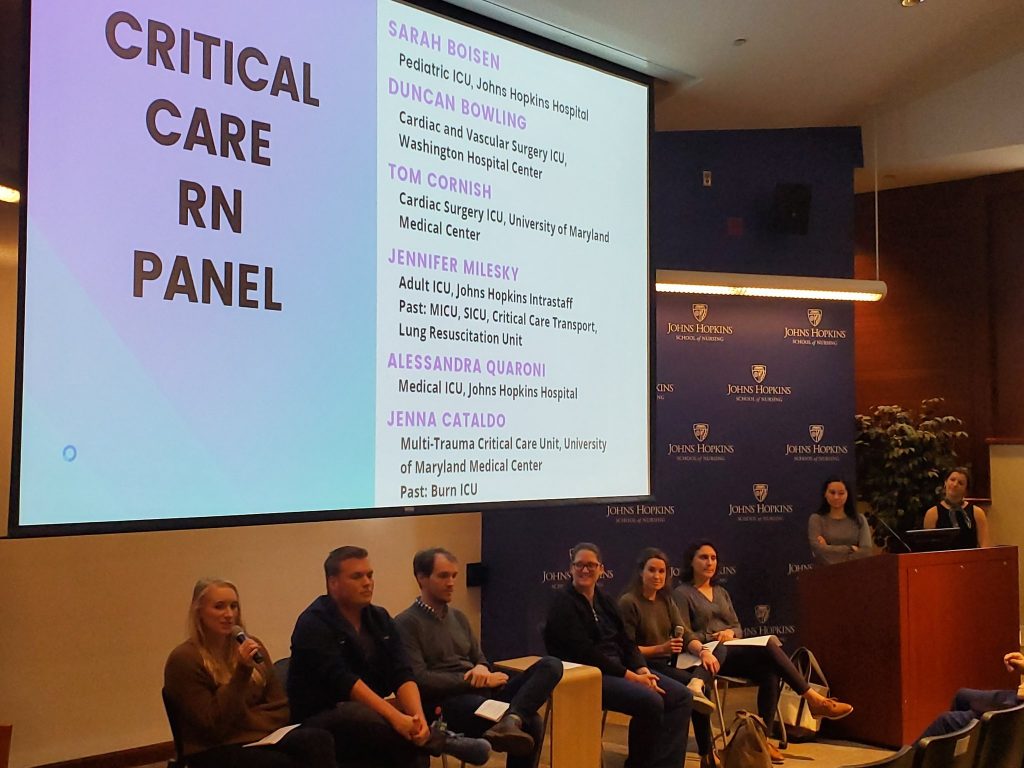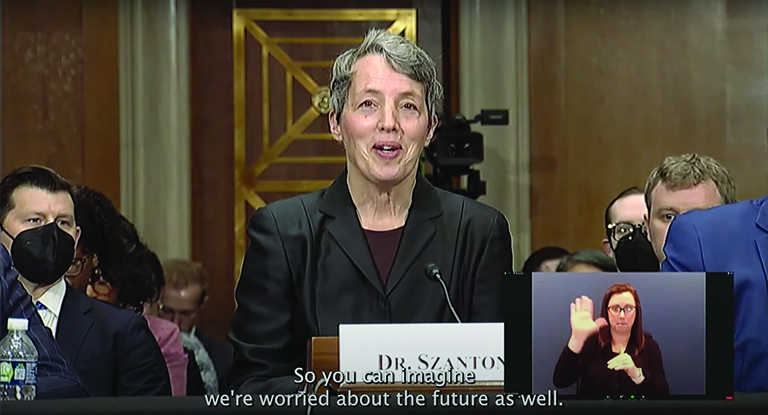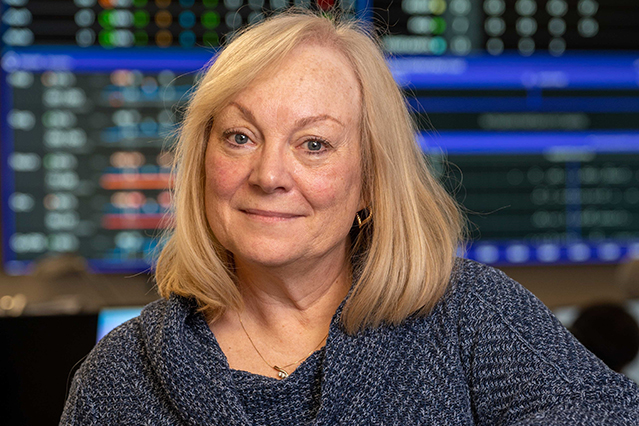Watch the critical care nursing panel discussion with alumni and faculty
For you, it’s just a typical day at work, for them, this may be the worst day of their life. They may be angry, stressed, scared. You’re trying to keep your patient alive while managing their loved ones’ emotions. It’s a steep learning curve.
How to Become a Critical Care Nurse
Johns Hopkins School of Nursing faculty and alumni talked to current students about pursuing a career in critical care, an event hosted by the Critical Care Interest Group, led by co-presidents Savannah Meng and Marie Aguinaldo. Some words of advice? “When you start, you feel stupid. You don’t learn about these specialties in school. Once you get over that, you’re fine.” Here’s more of what they had to say.
What are the best parts of working in the ICU?
When some people arrive on the unit, they are essentially dead. Then you resuscitate them and they walk out later… it’s amazing.
Comfort care for the dying is actually rewarding. You give them dignity, help the family. It’s an honor to be such an impactful part of someone’s life.
You have a lot of autonomy. Just because a doctor puts in an order doesn’t mean you have to do it.They expect you to question it because it’s a team.
What are some of the challenges of working in an ICU?
The first year, the learning curve is so steep. You’ll have moments when you feel like you’re drowning, but give yourself grace and time—you will get there.
Learning how to deal with people dying. Finding a good support system.
On entering ICU as a new grad…
You are at work, but the person in front of you is a person.
Not a collection of devices and ailments. You can’t teach people how to be empathetic, respectful, don’t lose that with the deluge of info you’ll get in the first year.
You can get caught up in the sexy critical care stuff, but you have to remember to do the basics, go back to foundations. No matter when you start, there is always something to learn.
Search for nurse residency programs. They’re 16-18 weeks long and it’s a structured environment to ease you into the ICU. The beauty of the ICU is that you may only have one or two patients, so you can really focus on them.
Tips for the ICU interview:
Basic interview skills apply—dress the part, bring your resume, and ask questions! Show you’ve done your research.
Try to get a tech job at an ICU or shadow at different ICUs, every unit is different. Show that your first 12 hours on the ICU are not on your first day on the job.
Your interview with the manager isn’t your real interview, the interview with the staff is the real thing. Be teachable. If you have a bad attitude they aren’t going to hire you.
Many people pursue ICU experience as a stepping stone to become a nurse anesthetist. Don’t lose sight of the now—hiring managers want people who are going to be good critical care nurses, not just people that are checking a box for the next thing.
Critical Care RN panelists included:
- Sarah Boisen: Pediatric ICU at Johns Hopkins Hospital and a 2018 graduate of the MSN (Entry Into Nursing) program.
- Duncan Bowling: Nurse manager on the cardiac and vascular surgery ICU at Washington Hospital Center and a 2017 graduate of the MSN (Entry Into Nursing) program.
- Tom Cornish: Cardiac surgery ICU, University of Maryland Medical Center and a 2017 graduate of the MSN (Entry Into Nursing) program.
- Jennifer Milesky: Johns Hopkins School of Nursing faculty and adult ICU at Johns Hopkins Hospital. She has worked on the MICU, SICU, Critical Care Transport, and Lung Resuscitation Units.
- Alessandra Quaroni: MICU at Johns Hopkins Hospital and a 2018 graduate of the MSN (Entry Into Nursing) program.
- Jenna Cataldo: Multi-trauma critical care unit at University of Maryland Medical Center, She has also worked on the burn ICU and earned her BSN from Johns Hopkins School of Nursing in 2012.
Learn more:
- Career Lab at the Johns Hopkins School of Nursing
- Advice to Nurses Considering a Career in Oncology
- How to Make the Most of Your Clinical Experience
- MSN (Entry into Nursing)
- DNP Advanced Practice
- Post-Master’s Pediatric Acute Care NP Certificate

ABOUT THE AUTHOR: SYDNEE LOGAN
Sydnee Logan is the Social Media and Digital Content Coordinator for Johns Hopkins School of Nursing. She shares what’s going on here with the world.


 From Health at Home to ICU, Pediatric Nurse Practitioners Talk About the Care Continuum
From Health at Home to ICU, Pediatric Nurse Practitioners Talk About the Care Continuum Class News Spring 2023
Class News Spring 2023 Nurses Lead the Charge to Early Discharge
Nurses Lead the Charge to Early Discharge You Can’t Beat Experience
You Can’t Beat Experience How Do We Care for Children with Disabilities?
How Do We Care for Children with Disabilities?







